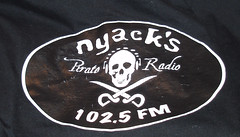After a few weeks of hard policy analysis on the radioshow, it’s time to get back to pirate radio. I’m scheduled tomorrow night to talk to DJ Johnny Silver from Nyack’s Iron Action Radio for broadcast on Friday.
 It looks like Johnny plans to broadcast the interview live on Iron Action, which also has a webstream. So if you’re in Nyack, NY you can tune in 102.5 FM at 7 PM EST. If you’re elsewhere, try to catch Iron Action’s webstream at nyackradio.com to hear the unedited interview action.
It looks like Johnny plans to broadcast the interview live on Iron Action, which also has a webstream. So if you’re in Nyack, NY you can tune in 102.5 FM at 7 PM EST. If you’re elsewhere, try to catch Iron Action’s webstream at nyackradio.com to hear the unedited interview action.
In addition to being a prolific unlicensed broadcaster, Johnny Silver is also the star of a short film triology, dramatizing the DJ’s previous experience with the FCC. Johnny says that part 3 is too big for him to host online, but the trailer is posted for download at nyackradio.com. Johnny’s promised to send me a copy via snail mail, so perhaps I’ll be able to host it at here if the bandwidth load isn’t too incredible.
The mediageek radioshow airs live Fridays at 5:30 PM on community radio WEFT 90.1 FM in Champaign, IL. The program is posted for download by midnight Sunday Central time at the radioshow site, and is also heard on eight other stations across North America.
Read some previous posts about DJ Johnny Silver and Iron Action Radio.
Leave a Reply